#the Catechism says men and women were made together and for each other
Explore tagged Tumblr posts
Text
sincere question: how do you guys think Catholic women ought to interact with men who aren't their husband/family? how is it the same as or different than women?
#like ok random man doesn't have authority over random woman#however men and women are different#and like presumably Catholic women should not be engaing w men identically to non-Catholic women#and that extends beyond just relationships/sex stuff#idk I've been thinking about it a lot lately#also Christian moots please feel free to reblog and just switch Catholic to Christian#idk why I'm being overly specific#the Catechism says men and women were made together and for each other#I have to imagine that extends to being a somewhat general statement#in terms of complementarity#how do the components of the feminine genius (receptivity generosity sensitivity and maternity) extend in these situations?#St. John Chrysostom and St. Paul are haunting meee
10 notes
·
View notes
Text
HOMILY for 19th Sunday after Pentecost (EF)
Eph 4:23-28; Matt 22:1-14
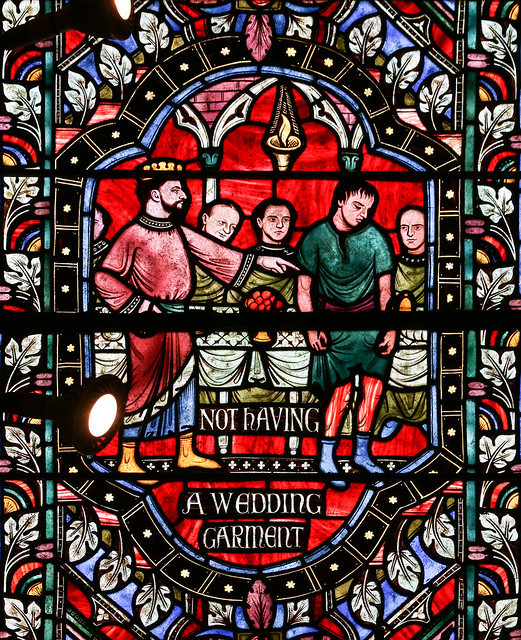
Last weekend the Holy Father Pope Francis released his third encyclical, Fratelli tutti, which speaks of “fraternal love”, and he considered “its universal scope, its openness to every man and woman.” (para 6) Indeed, today’s Gospel sets out for us the universalising scope of God’s saving love, which, through the Incarnation, makes Christ to be brother to all men and women. Fraternal love, therefore, is rooted in the Incarnation of Christ. And this is the good news that we preach: that because of Christ, salvation is now open to all peoples.
But it was not always so. Salvation, was at one time, only understood to be open to those who were chosen, who were invited. Hence today’s Gospel parable begins like this: “The kingdom of heaven may be compared to a king who gave a marriage feast for his son, and sent his servants to call those who were invited to the marriage feast.” (Lk 22:2-3) Heaven is referred to as a wedding feast because heaven is the intimate union of Man to God, and anyone who paid attention to the Jewish Scriptures, especially the beautiful Song of Songs would have been familiar with the nuptial image as a metaphor for God’s covenant with Israel, his election of the Jewish people, and his saving love for them. Thus Deuteronomy says: “the Lord your God has chosen you [Israel] to be a people for his own possession, out of all the peoples that are on the face of the earth.” (Deut 7:7) Today’s Officium (entrance chant) hints at this: “I am the salvation of the people, says the Lord”, and ‘the people’ originally referred to the people of Israel of course. So, God chose the people of Israel, and called them into a covenantal relationship with him, into a marriage-like bond of fidelity and trust.
But, as today’s parable says, “they would not come.” (Lk 22:3) So, as the parable put it, God sent his servants, that is to say, the prophets to call the chosen people of Israel, telling them that the wedding banquet was ready. But the people made their excuses, preferring their own affairs and concerns and idols to the commandments of God. Solomon, for example, indulged his many pagan wives and so, Scripture says, “his heart was not wholly true to the Lord his God” but was “turned away… after other gods” (1 Kgs 11:4) And Jeremiah the prophet is sent to plead with Israel to return to God, but they persecute him, imprison him, and try to kill him. The Gospel parable thus says that the King’s servants were seized, treated shamefully, and killed (Mt 22:6). Hence Jesus laments the hard-heartedness of God’s chosen people: “O Jerusalem, Jerusalem, killing the prophets and stoning those who are sent to you! How often would I have gathered your children together as a hen gathers her brood under her wings, and you would not!” (Lk 13:34) In the parable, the King then responds with anger. So, too, in the history of Israel, as the prophets warned, the Jewish people are subjected to war and destruction, and ultimately Jerusalem is destroyed, king and people are captured, exiled from the Promised Land, and scattered.
This becomes a turning point in the parable and in salvation history. In today’s Gospel parable the King then says: “The wedding is ready, but those invited were not worthy. Go therefore to the thoroughfares, and invite to the marriage feast as many as you find.’” For this means that salvation is now offered, not just to the chosen people of Israel, but instead to all comers; to as many as can be found by God’s servants. The prophet Isaiah, who wrote after the Babylonian Exile of Israel, thus presents a more universal vision of salvation: “It shall come to pass in the latter days that the mountain of the house of the Lord shall be established as the highest of the mountains… and all the nations shall flow to it, and many peoples shall come… For out of Zion shall go forth the law, and the word of the Lord from Jerusalem.” (cf Isa 2:3) Therefore, God’s salvation, which is found in keeping the law of God, is now extended to all nations, and many peoples shall come. Hence in the Gospel parable, God’s servants are told to call to the wedding feast as many people as they can find, and hence the Lord Jesus says in today’s Gospel that “many are called.”
You and I, are among the many – in Greek, the hoi polloi – and we have been gathered together, off the streets, as it were, into the great wedding hall. As Jesus says in the parable: “those servants went out into the streets and gathered all whom they found, both bad and good; so the wedding hall was filled with guests.” The Patristic interpretation is that the Church is the wedding hall, and so, in the Church we find everybody, both bad and good, for all are called. Thanks to the saving sacrifice of Christ on the Cross, salvation is now open to all peoples. As Pope Francis affirms in his encyclical, “Christ shed his blood for each of us and [we believe] that no one is beyond the scope of his universal love.” (Fratelli tutti, 85)
Hence the Church of Christ is, as the Catechism says, “‘the universal sacrament of salvation,’ by which Christ is ‘at once manifesting and actualizing the mystery of God's love for men.’” (CCC 776) Thus one of the marks of the one true Church is that it should be catholic, which means not simply ‘universal’, as it’s often translated, but rather ‘of the whole’, or ‘of the totality’. We, of the Catholic Church, then, are the many, the totality, the multitude, the hoi polloi who have been found by God’s servants, invited by God’s grace, and thus called together into God’s wedding hall, into Christ’s Church.
However, although “many are called, few are chosen”. In fact the word translated as few is a Hebraism probably understood as “not” polloi, not “the many”. In other words, not all of the multitude who are called into the Church will necessarily be chosen. And the phrase ‘chosen’ (elektoi) in the New Testament refers to those who receive final salvation through the grace of Jesus Christ. So, we need to understand this as a warning and a challenge that although God calls the bad and the good indiscriminately, although we’ve all been baptized Catholics, even, this does not mean that all of those who are so called will ultimately find salvation in Christ and share in his heavenly banquet. Why not?
Because, as the parable puts it, some are without their wedding garment. In the New Testament, St Paul speaks of being clothed in Christ (Gal 3:27). Or in today’s epistle, he says that we Christians should “put on the new nature.” Hence, at our baptism, we are clothed in white garments, and told to keep them, i.e., keep ourselves, “unstained” by sin until Christ returns and we partake in the wedding feast of the Lamb. The baptismal garment, therefore, is to become our wedding garment – an image of our Christian dignity, given us in baptism, and the grace of baptism is to grow and flourish in our lives until we are “washed white in the blood of the Lamb”, as St John says (Apoc 22:14), until we are sanctified such that we have the virtues of Christ, and can love as he does. Each of us, who have been baptised into Christ, have received this grace. The question is whether or not we desire holiness, whether or not we choose to put on our wedding garments, and so choose to take off our sinful habits, our angry desires, and will be renewed in mind and heart. (cf Eph 4:23)
So, just as the chosen people of Israel are to remain faithful to their covenant with God; just as the kings of Israel must have hearts wholly true to God; and just as Isaiah sees that those who come to the mountain of the Lord will desire to keep God’s Word, so, the many who have been called into Christ’s Holy Church must likewise faithfully obey the commandments of Christ, and keep his Word. And “this is my commandment”, says the Lord, “that you love one another as I have loved you.” (Jn 15:12) What this looks like, practically speaking, is found in the epistle. St Paul says to the Ephesians: “Let all bitterness and wrath and anger and clamour and slander be put away from you, with all malice, and be kind to one another, tenderhearted, forgiving one another, as God in Christ forgave you.” (4:31f)
Finally, the parable offers us a beautiful image of God’s forgiveness, mercy, and grace. The king goes to the man without the wedding garment, and he calls him “Friend”. (Mt 22:12) Again and again God mercifully extends the grace of repentance to us, calling us back to friendship with him, inviting us to the marriage feast of heaven, summoning us out of sin and into an ever deeper union with him through charity. Therefore, each day, let us hear the gentle voice of God’s grace calling us to greater holiness: “everything is ready; come to the marriage feast.” (Mt 22:4)
4 notes
·
View notes
Text
The Princess and the Knight (A “Flower Child” One-Shot)
A/N: Lololol, I don't quite know how to explain myself, but last night, I suddenly got the urge to write "Flower Child" Blue and Yellow's first meeting... and so I did. Muse is such a wild thing, lol. The title and minor gimmick comes from Yellow's dream in Chapter 6!
AO3
—
Just because she knew it would piss her mother off, Yellow Diamond straddled the limo seat as though she had never seen a chair before, one knee at kingdom and the other at come. A daring smile languished in her golden eyes, on her lips, and in the haughty tilt of her aquiline nose.
White Diamond, magnificent as always in a shimmering backless number, was not impressed.
“You’re being impossible,” she hissed, all politeness (all thinly veiled anger). Her mouth did not say what her shining black eyes did. The fifty-nine year old CEO had long been masterful at the art of strangling all of her emotions into a voice so saccharine that it could have spun honey.
Yellow, on the other hand, meant every word she said.
Yellow, on the other hand, had a laugh like a bark—harsh, discordant, unfiltered.
“I thought we weren’t allowed to use that word,” she taunted. “Nothing is impossible for us Diamonds and all of that aphoristic nonsense.”
“You know what I meant.”
The twenty-one year old flicked a lazy hand through her stiff coiffure, causing her mother’s nostrils to flare slightly.
“I know only what I’ve been told.”
“Smart aleck,” White said primly, her gaze sharp enough to cut yourself on.
“I learned from the best,” Yellow retorted, her natural bluntness the weapon she brought to the table in return.
At a stalemate, they collapsed into an electric silence then, refusing to look at each other. Outside the black tinted windows, the modern part of the city gave way to the old-moneyed part of the city. Squared apartments became old Grecian buildings became manicured bushes became signs on every corner that let one know that this place was historic. A renowned senator attended school here. A President signed a declaration there.
The damn street lamps were gold.
Across from her, White Diamond’s microscopic sigh demanded to be heard, tiny though it was. She pinched the bridge of her pointed nose and stared plaintively at her daughter from behind the intricate tangle of her long fingers.
“I know you’d rather not be here.”
“You’re right,” Yellow acquiesced readily. “I’d rather be working on my application for grad school.”
“But,” White continued on as though she hadn’t heard her, “this is the most lucrative social event of the season, Yellow! You’ll have the opportunity to rub shoulders with presidents and CEOs and princes and duchesses. You’ll get to prove your mettle as the incumbent heiress of Diamond Electric!”
Yellow’s face pinched itself together in the darkness. Disdain rolled off her shoulders in waves.
“You know I don’t care for any of those things, Mother. I know my own worth.” Her fists were clenched on her knees. “I know that I’m going to make a damn fine CEO one day.”
“It isn’t just about you, though,” White Diamond sighed again, and by some grand miracle, her forehead creased through all of the botox. “Crucify me for wanting the world to see who you are, too.”
Yellow looked away at this, looked out of the window.
The streetlights suffused across her face.
Orange in the hollows of her cheeks.
Gold.
“You’re my daughter, Yellow, and because of that, but also beyond that, you’re extraordinary.”
The sincerity pressed against Yellow’s skin.
It made her itch.
“Be a dear and let someone know it tonight.”
—
Blue Montgomery stood between her mother and father and tried very hard not to remember that she was a crown jewel. Pale and slender and draped in blue silk, she was a porcelain doll reconciled. And tonight, as was the lot of most porcelain dolls, she would be packaged and sold, would be auctioned off for charity.
You, sir—yes, you!—could win a lunch date with the Alistair Montgomery’s daughter if you throw money at this vaguely philanthropic cause!
Look at her!
She’s gorgeous and smart but too cold and distant to be a threat to your fragile sense of masculinity! You can call her sweet thing and then affably write her off as a heartless shrew when it’s all said and done!
She’s perfect!
The misogyny of it all was not lost on this young woman, but as she sipped champagne from a skinny flute, she desperately tried to make it so.
She was a Montgomery.
And that meant something around these parts.
At the very least, it meant that she had to perform.
So when old men came up to them and called her charming, she smiled, all teeth, and took it; they kissed her on the hand and cheek. Their hands sometimes fell from her waist to her ass.
She politely affirmed that she was Ivy League material, but dared not talk about her own ambitions lest they were too ambitious to belong to the likes of her.
She held her head high, even though the weight of the diamonds around her neck felt like a noose.
Blue Montgomery was perfect in every conceivable way.
(She was extraordinarily miserable.)
“Oh, Alistair,” Vivian Montgomery whispered cattily under her breath, “look who’s heading this way.”
As her mother quickly rearranged her haughty disdain into a socialite’s politeness, Blue followed her father’s austere gaze to the pair of people now approaching them, and was promptly surprised to find that she immediately recognized the older of the two. Even if she hadn’t been in a sweeping silvery dress, White Diamond, founder and CEO of the fastest rising company in Empire City, was unmistakable.
Nowadays, she often smiled sultrily at you from the covers of Forbes and Fortune, magazines that were the bread and butter, the Bible and Catechism of the Montgomery household. She had spiky white hair and glittering black eyes and a plump smile that was about as safe as an unsheathed knife.
Blue’s parents didn’t much care for her.
Didn’t care for anyone really who wasn’t already born with a gold pacifier in their mouth.
“White!” Vivian exclaimed as though they were all dear friends.
“Vivian! Alistair!” White Diamond gamely played along, extending her pale arms outwards for an embrace with her mother.
The two women hugged like two women who hate each tend to do—quite warmly—and as the CEO withdrew, Blue noticed that her finely manicured nails were blacker than night, pitch.
She extended one of these ink tipped hands towards her companion, whom Blue had quite forgotten to notice, so distracted by the positively peacocking White, but now, she afforded a closer look.
(“You remember my daughter Yellow, right?”)
It was rather difficult to make an impression next to the nigh ethereally striking White Diamond, but Yellow Diamond almost came close, Blue thought, studying this slender statue of a CEO’s daughter as their parents exchanged passive aggressive pleasantries about them over them.
(“My Yellow just finished an undergraduate thesis!”)
(“Our dear Blue was recently accepted into Yale for graduate school.”)
There was something almost Grecian in Yellow’s aspect, with her sharply defined jawbone and ultra straight nose. The taut muscles in her creamy neck ran smoothly into her crisply ironed button down. She wore a suit vest and matching dress pants the very color of her mother’s nails. Her hands were tucked somewhat insolently into her pockets, but a frown was tucked more subtly in the firm press of her plump lips.
These little quirks aside, she very well looked like the future CEO of Diamond Electric one day.
So Blue Montgomery did what Montgomerys do.
She performed.
“Hello,” she ventured politely. (Yellow’s golden eyes raked her appraisingly, but at least she didn’t try to grab Blue’s ass, which was a nice change in pace all things considering.) “Are you enjoying the night so far?”
(“White,” Alistair crooned and lied, “you have to come out to the estate sometime.”)
(“Of course!” White crooned and lied in courteous return. “That would be lovely.”)
“I suppose I’m compelled to say yes,” Yellow answered drolly, her gaze subtly sliding over to her mother. “And you?”
It was the honesty that was so surprising to Blue, for honesty was so rare in this picture perfect life that she lived.
She arched an eyebrow.
Something small quirked at her lips.
She made sure that her parents were still wrapped up in out-politing White before she replied.
“Likewise.”
The golden-eyed heiress only grinned.
—
As they walked away from the Montgomery trio, Yellow Diamond couldn’t quite leave one Montgomery behind.
Blue Montgomery.
Blue.
Her long, brown hair spilled across her back in silky waves. There were oceans in her delicately shaped eyes, seas in the midnight blue gown that poured down her body.
Something secretive in that little smile of hers.
Something that suggested that discovering her would be a treasure all on its own.
Of course, White Diamond, because she was White Diamond, knew instantly.
As she sashayed through the spillage of gowns and tuxedos, outshining them all, she admonished her daughter lightly.
“She’s a Montgomery,” she warned, a party ready smile still slashed across her face. “Her empire is oil, and the very same has run through her blood for generations upon generations. Her parents look down on us for being what they refer to as new money. Assuredly, she does, too.”
Alistair Montgomery was the richest oil tycoon on the East Coast.
Just like his father before him had been.
And his grandfather.
And his great-grandfather.
And—
“And you know”—White waved airily at some senator and some prince and some other important person and still found time to belabor the point—“she’s probably not inclined the way you are.”
Yellow scowled.
Deeply.
“Thanks, Mother.”
White posed for a camera just as her daughter deftly stepped out of the frame.
“I’m only trying to spare you the heartbreak, dear.”
—
Before the auction, there was a silent auction, and rich people meandered from white-clothed table to white-clothed table to bid on items such as artisanal doorknobs for ten thousands of dollars.
(Vivian Montgomery was one of these people, and surprisingly enough, her daughter was, too. Granted, she chased a different kind of stupid commodity to blow money on.)
After extracting herself from the attentions of a senator’s son—who was more interested in her cleavage than her personage—Blue found herself at a table where rare books were being auctioned. Folio copies of Jane Eyre and The Iliad and The Scarlet Letter. Signed Hemingways and first edition Joyces. A full, antiquated set of the Oxford English Dictionary.
A lover of all things literature, a delicate smile adorned the twenty-one year old’s features.
A connoisseur of Greek mythology, she found herself drawn to the folio of The Iliad.
The highest bid was currently $450.
Without the slightest hesitation, in her sweeping handwriting, Blue topped that number with $1,000.
“That seems excessive,” came a dry voice at her shoulder.
She bristled at the closeness of the voice and turned to confront it, only to find herself face to face with Yellow Diamond.
Her golden eyes were edged in playfulness.
And insolence.
And arrogance.
She looked like a shark amongst men.
Next CEO of Diamond Electric, Blue reminded herself, forcing her indignation into some semblance of a polite smile. She didn’t mean any harm.
“We’re all wealthy here,” she said, intimating a shrug with her voice (for ladies did not shrug). “Excess is the playground we thrive in.”
“I thought this whole charade was supposed to be for charity?” Yellow teased. As the night had worn on, the hairspray which had held her coiffure together had seemingly given up the ghost, leaving her golden hair to spill around her head like a crown of feathers.
“Mm”—Blue pretended to be deeply invested in the list for her beloved book again—“that’s the keyword, isn’t it, though? Charade.”
The heiress laughed.
It was a harsh, clanging sound.
It fit her like a glove.
“Charade indeed.”
—
Yellow continued asking questions, and Blue continued to answer them as they went from table to table without really looking at anything… except for each other. (They passed glances, back and forth, gold meeting blue meeting gold.)
“Why do you prefer Greek mythology so much?”
“Because it’s nice to be swept away on the wine dark sea with all kinds of flawed heroes and villains, goddesses and monsters. Their tragedies are poignant because they’re human.”
“What could you have been doing tonight besides being here?”
She sighed wistfully, the sound trailing through the air like dandelion dust. “Literally anything.”
“Is this… okay?” Yellow gestured somewhat awkwardly to the charged space between them. Perhaps the better question to have asked would have been: Am I okay being here? But one query was certainly more vulnerable than the other, and dammit, Yellow would endure so many more things before she would ever admit to vulnerability.
Blue tilted her head, and a curtain of her thick hair swept to the side, leaving her slender neck exposed. Yellow’s pulse was somewhere in the column of her throat.
“I don’t see why not.”
They continued in this manner—on and on—and would have done so all night had Mrs. Montgomery not interrupted them as they were discussing trickle-down economics in the shallow way that only twenty-something-year-old capitalists could.
Mrs. Montgomery appraised Yellow with a cold politeness before just as coldly shutting her out of the conversation.
“The auction will be starting soon,” she said, straightening Blue’s necklace. “Perhaps you should take a reprieve to freshen up in the bathroom?”
It was a question, but it was also not a question.
Yellow Diamond was well familiar with the art of the implicit command given her own mother.
“Of course, Mother,” Blue replied with a smile that never quite reached her sapphire eyes. Seemingly satisfied, Mrs. Montgomery heeled away, and Yellow leveled a frown at her companion.
“You’re going to be part of the auction?” Oh, there was certainly some horror in her voice.
A fair dash of indignation, too.
“Don’t look at me like that,” Blue snapped and then blanched when she realized she did.
It was the first time she had risen her voice all night, for she was remarkably self-possessed.
But she was also only human.
(It was kind of hot, but it was more so infuriating given what she was raising her voice for.)
Narrowing her eyes, Yellow took the bait.
“Why not?” She asked scathingly. “Pray tell why shouldn’t I be concerned that you’re about to get up on that stage and be sold like a pig for the slaughter?”
Blue looked wildly around for ears and eyes that were too obsessed with their own selves to care about the conversation two spoiled heiresses were having.
“Keep your voice down!”
“Fine,” Yellow hissed. “I’m still not impressed with what you’re about to do, though.”
Blue’s dark hair seemed to frizz around the outline of her face.
“You don’t have to be! I barely know you!”
“Hell, I don’t have to know you to know that auctioning off women is screwed up.”
Blue Montgomery recoiled where she stood, a ship upended in the sea, and it was then that Yellow knew they were on the same page.
That horror was rising in them both like storms.
“It’s just a lunch date,” she whispered.
Justifying it.
Convincing herself.
Stomaching something unimaginable.
Yellow shook her head, her mouth pressed into a thin, exacting line.
“I’ll believe that when you do.”
—
Blue Montgomery stood on the stage, swollen in white spotlight, and could not forget that she was the crown jewel of this auction. Pale and slender and draped in blue silk, she was no embroidered golf bag, nor three day vacation to a ski resort. She was something better—flesh and blood and a pipeline to Montgomery family oil. She was a porcelain doll reconciled. The auctioneer saved her for last.
“And now we have Blue Montgomery, who has so charitably agreed to go on a lunch date with the highest bidder! Give it up for our dear Alistair’s lovely, brilliant daughter!”
Applause sweltered below.
There was a hunger in the air.
“Let’s start the bidding at $50! Do we have $50? Yes, we have $50!”
The senator’s son whose eye line was permanently drawn below her face.
“Oh, sorry, son! Looks like we have $100! $150! $200!”
An older man with a walrus mustache.
He smiled up at her with all of his shiny teeth.
Blue was going to be sick.
“$300! $350! Goodness, you men are amped up! Ahaha, but there’s no question as to why! $400! $450!”
It was the senator’s son again.
“$450 going once!”
A couple of tuxedoed companions slapped congratulations on his smug back.
“$450 going twice!”
It was sickening to watch.
It was impossible to comprehend.
All of the blood drained from Blue’s face and pooled in her throat.
She was drowning in it.
Suffocating.
“Sol—hold on, lad!” The auctioneer suddenly placed his hand over his eyes as a visor against the harsh spotlight. Blue couldn’t quite make out what he was looking at, the world dancing across her eyes, swaying and blurring.
“$1,000 from the young man in the back!”
The crowd gasped. (They all liked a good drama.)
“$1,000 going once!”
Senator boy petulantly hurled himself back into his chair.
“$1,000 going twice!”
His friends promptly slapped condolences on him.
“Sold! Congratulations, sir! You’ve just landed a date with a very special lady this weekend! C’mon up and meet her!”
Tuxedos and gowns and gasps and whispers parted down the middle to let the dumbass who just spent $1,000 dollars on a date through.
Her head was held high.
Her grin could have rent the world in two.
Blue’s lips parted in a soft oh of surprise as Yellow Diamond ascended the stairs, two steps at a time.
What a dumbass, that knight in shining armor.
What a wonder.
—
Backstage, the princess awarded her savior with a softened glance.
And a thank you, quietly spoken.
Meant.
“Listen, it was either this or me punching that guy,” Yellow shrugged, quite obviously embarrassed. Even her pointed hair seemed to be in shock, standing up on end.
“Seems excessive,” Blue batted back, a wry tilt at her lips.
Yellow Diamond didn’t miss a beat.
“We’re all wealthy here,” she grinned. “Excess is the playground we thrive in.”
But then, just as quickly as she had lightened, the heiress’s face became all seriousness again, harsh angles and even harsher lines.
“I’m not going to hold you to that date, though,” she said with an emphatic shake of the head. “You’re not a damn trophy to bought and sold, Blue, and besides”—she laughed that singularly dissonant laugh again—“you’re worth way more than a thousand dollars.”
Blue thought she would have been more relieved to be freed from the obligation.
But she wasn’t.
And it confused her.
Somehow, she mustered some semblance of a smile.
“That’s very generous of you,” she murmured. “Thank you.”
Yellow Diamond dragged a self-conscious hand across the back of her neck; red popped across her sharp cheekbones in what very well may have been a blush.
They weren’t standing very far apart from each other.
There was electricity in the air.
Potential.
Blue wondered what it would be like to run her fingers through that lush, golden hair.
(And forgot to wonder why she was even wondering such a thing.)
“Anytime.”
—
“What the hell, Moms?” Pink Diamond protested, slapping her hands on the marble countertop before turning on Blue. “I grew up half of my life thinking Momma opened a trapdoor and, like, found you or something!”
“Language,” Blue only chided, but the smile softening her lips betrayed her.
(Love did.)
Leaning against the fridge, arms crossed over her chest, Yellow’s laugh was like a bark—harsh, discordant, unfiltered.
“I didn’t slay any dragons per say,” she smirked, “but you should have seen the look on pretty boy’s face when I outbid him.”
“It was quite the sight,” Blue agreed, a mischievous tilt in her dark eyebrows.
“Damn straight.” Yellow’s golden eyes shone with the memory.
Looking between her parents, Pink only laughed and clapped her hands together. The freckles scattered across her cheeks bunched up and then expanded with each humor-stricken breath.
“And so the princess and the knight…” she grinned with an inviting tip of her head towards Blue.
“And the little elfin poppet,” Blue added, reaching across the countertop to brush a smudge off her daughter’s pointed nose. (Pink always had some smudge on her face or another. Paint. Makeup. Glitter.)
“Lived their happily ever after,” Yellow rolled her eyes, like she was above their sugary nonsense, though she was quite obviously perfectly content to inhabit it all the same.
In that kitchen, Pink Diamond was seventeen years old.
By then, she had already lived out most of her life.

#bellow diamond#white diamond#pink diamond#flower child#mimik-u#s: steven universe#i'm so sleepy now
348 notes
·
View notes
Photo

26th April >> Fr. Martin’s Gospel Reflections / Homilies on Luke 24:13–35 for The Third Sunday of Easter, Year A: ‘Jesus himself came up and walked by their side’.
Third Sunday of Easter, Year A
Gospel (Europe, Africa, New Zealand, Australia & Canada)
Luke 24:13-35
They recognised him at the breaking of bread
Two of the disciples of Jesus were on their way to a village called Emmaus, seven miles from Jerusalem, and they were talking together about all that had happened. Now as they talked this over, Jesus himself came up and walked by their side; but something prevented them from recognising him. He said to them, ‘What matters are you discussing as you walk along?’ They stopped short, their faces downcast.
Then one of them, called Cleopas, answered him, ‘You must be the only person staying in Jerusalem who does not know the things that have been happening there these last few days.’ ‘What things?’ he asked. ‘All about Jesus of Nazareth’ they answered ‘who proved he was a great prophet by the things he said and did in the sight of God and of the whole people; and how our chief priests and our leaders handed him over to be sentenced to death, and had him crucified. Our own hope had been that he would be the one to set Israel free. And this is not all: two whole days have gone by since it all happened; and some women from our group have astounded us: they went to the tomb in the early morning, and when they did not find the body, they came back to tell us they had seen a vision of angels who declared he was alive. Some of our friends went to the tomb and found everything exactly as the women had reported, but of him they saw nothing.’
Then he said to them, ‘You foolish men! So slow to believe the full message of the prophets! Was it not ordained that the Christ should suffer and so enter into his glory?’ Then, starting with Moses and going through all the prophets, he explained to them the passages throughout the scriptures that were about himself.
When they drew near to the village to which they were going, he made as if to go on; but they pressed him to stay with them. ‘It is nearly evening’ they said ‘and the day is almost over.’ So he went in to stay with them. Now while he was with them at table, he took the bread and said the blessing; then he broke it and handed it to them. And their eyes were opened and they recognised him; but he had vanished from their sight. Then they said to each other, ‘Did not our hearts burn within us as he talked to us on the road and explained the scriptures to us?’
They set out that instant and returned to Jerusalem. There they found the Eleven assembled together with their companions, who said to them, ‘Yes, it is true. The Lord has risen and has appeared to Simon.’ Then they told their story of what had happened on the road and how they had recognised him at the breaking of bread.
Gospel (USA)
Luke 24:13–35
They recognized Jesus in the breaking of bread.
That very day, the first day of the week, two of Jesus’ disciples were going to a village seven miles from Jerusalem called Emmaus, and they were conversing about all the things that had occurred. And it happened that while they were conversing and debating, Jesus himself drew near and walked with them, but their eyes were prevented from recognizing him. He asked them, “What are you discussing as you walk along?” They stopped, looking downcast. One of them, named Cleopas, said to him in reply, “Are you the only visitor to Jerusalem who does not know of the things that have taken place there in these days?” And he replied to them, “What sort of things?” They said to him, “The things that happened to Jesus the Nazarene, who was a prophet mighty in deed and word before God and all the people, how our chief priests and rulers both handed him over to a sentence of death and crucified him. But we were hoping that he would be the one to redeem Israel; and besides all this, it is now the third day since this took place. Some women from our group, however, have astounded us: they were at the tomb early in the morning and did not find his body; they came back and reported that they had indeed seen a vision of angels who announced that he was alive. Then some of those with us went to the tomb and found things just as the women had described, but him they did not see.” And he said to them, “Oh, how foolish you are! How slow of heart to believe all that the prophets spoke! Was it not necessary that the Christ should suffer these things and enter into his glory?” Then beginning with Moses and all the prophets, he interpreted to them what referred to him in all the Scriptures. As they approached the village to which they were going, he gave the impression that he was going on farther. But they urged him, “Stay with us, for it is nearly evening and the day is almost over.” So he went in to stay with them. And it happened that, while he was with them at table, he took bread, said the blessing, broke it, and gave it to them. With that their eyes were opened and they recognized him, but he vanished from their sight. Then they said to each other, “Were not our hearts burning within us while he spoke to us on the way and opened the Scriptures to us?” So they set out at once and returned to Jerusalem where they found gathered together the eleven and those with them who were saying, “The Lord has truly been raised and has appeared to Simon!” Then the two recounted what had taken place on the way and how he was made known to them in the breaking of bread.
Reflections (4)
(i) Third Sunday of Easter
There are places to which Christians have been going on pilgrimage for a very long time. Places associated with Mary are important places of pilgrimage for many Catholics, such as Knock Fatima and Lourdes. There are other places which have been the destination of pilgrims for a much longer period of time, such as Santiago de Compostella. Even older again is Rome, and older again is Jerusalem. The city of Jerusalem had been a centre of pilgrimage for Jews for hundreds of years before the coming of Jesus. Since the time of Jesus it has been a centre of pilgrimage not only for Jews but also for Christians. It is also a very important place of pilgrimage for Muslims. There is no other city that is such a significant a pilgrim destination for three major world religions.
In today’s gospel reading two followers of Jesus are walking in the opposite direction to pilgrims, away from Jerusalem. It is a city that no longer holds any attraction for them, because it is the city where their hopes have been dashed, where the person they have left everything to follow had been cruelly put to death. Unlike the pilgrims who walk with a sense of joyful anticipation, they walk in a despondent state, their faces downcast. The gospel reading says that ‘they were talking together about all that had happened’. When something traumatic happens to us, we feel the need to talk about it to someone we trust, whom we know will listen to us with care and attention. When a loved one dies, we try to come to terms with it by talking about it. We tell the story of the person who has died, very often with a focus on the final days or weeks of his or her life. The two disciples were struggling with a deep sense of loss. They had a story they needed to tell and they told it to each other, and they listened to each other’s story. One of the loving services we can render each other is listening to each other’s heartfelt and painful stories, especially in these times of Coronavirus.
The two disciples were suddenly joined by a stranger who invited them to share their story with him, ‘What matters are you discussing as you walk along?’ He was inviting them to open their hearts to him. Cleopas began to tell their story. In a few sentences, he spoke about the wonderful ministry and the crushing death of Jesus of Nazareth and, then, as a perplexing appendix, the story of how women disciples found his tomb empty on the third day. Jesus has entered fully into our human condition. As risen Lord he continues to be in communion with us, in all the ups and downs of our human condition. He invites us, as he invited the two disciples, to share with him the story of our lives in all its various hues. Through his life, death, resurrection, he has befriended us and he calls out to us to entrust our lives to him as we would to a friend, including the pieces and fragments of our sometimes shattered lives. The old Catechism definition of prayer was the raising up of our minds and hearts to God. We can also think of prayer as the opening up of our minds and hearts to the Lord, the sharing of our life story with him in all its diversity. Today’s gospel reading suggests that the Lord walks with us through life and listens when we share deeply with him.
Having listened to the two disciples, the stranger spoke to them. Having heard their story, he told them a wider story, drawn from the Jewish Scriptures, a story that began with Moses and the prophets. The story the two disciples told ended in death; the story the stranger told from the Scriptures ended in glory, ‘Was it not ordained that the Christ should suffer and enter into his glory?’ Jesus was sharing God’s story with the disciples and inviting them to see their story in the light of that bigger, more glorious, story. The Lord wants to do the same for us. He continues to speak to us in and through the Scriptures, inviting us to see our own personal journey in the light of God’s loving journey towards us. Our point of view, like that of the two disciples, can be limited. The Lord, through his word, opens us up to God’s point of view, which is so much more expansive and always rich in possibilities. In walking with the two disciples, the Lord transformed them from being downcast to having their hearts burn within them; he rekindled their hope. The risen Lord can transform our lives too, making us more hopeful people. When everything seems to be going wrong, he enables us to see the bigger picture of God’s loving plan for our lives.
When they arrived at their home town of Emmaus, the disciples invited the stranger to stay with them. He had touched their hearts and they didn’t want to let him go. At the meal that followed they recognized the stranger’s true identity in the breaking of bread. If we invite the Lord to stay with us, in response to the many ways he touches our lives, he will lead us to the Eucharist too, where his communion with us is deepened further. We may not be physically present at the Eucharist these days, but we are spiritually present and we continue to recognize the Lord in the breaking of bread. As we allow the Lord to touch our lives through others, through his word, through the Eucharist, we will be strengthened to continue on our pilgrim way with fresh hope in our hearts, just as the two disciples returned joyfully to Jerusalem after meeting the Lord.
And/Or
(ii) Third Sunday of Easter
There can be times in life when we find ourselves walking in the wrong direction. We get into a certain pattern, whatever it might be, and we sense that it is not really doing us justice. At some deep level, we are unhappy with the direction our lives are taking. We might even find ourselves walking away from something or somewhere when, in reality, we should be staying put, or walking towards it.
That appears to be the situation of the two disciples in today’s gospel reading. They were walking away from Jerusalem, when they really should have been staying put there, because it was in Jerusalem that the risen Lord intended giving them the Holy Spirit, and it was from Jerusalem that he would send them out to the ends of the earth. As they were heading to a village called Emmaus, they were heading in the wrong direction. It was grief and disappointment and disillusionment that caused them to head in the wrong direction. They wanted to get out of the city where Jesus had been crucified as quickly as possible. They had forgotten that Jesus had told them that, having been crucified by his enemies, God would raise him from the dead. Sometimes our own grief, or anger, or deep disappointment, can cause us to head off in wrong directions too. Our emotions can dull our memories and cloud our reasoning. We can find ourselves walking away from the very place or person that has the potential to give us life.
The risen Lord walked with the two disciples, even though they were heading in the wrong direction. He walked with them with a view to getting them to change direction, but before he could do that, he had to walk with them in the wrong direction for a while. He entered into their situation; he invited them to tell their story, ‘What matters were you discussing as you walk along?’ The story they told was the reason they were leaving Jerusalem, the very city where the Lord wanted them to remain. It was a sad story, but it wasn’t the whole story. They were missing the most important bit of the story. The story they told ended in death, but the full story ended in life. It was that full story that Jesus went on to tell them, ‘Was it not ordained that the Christ should suffer and so enter into his glory?’ Having heard Jesus’ version of the story, they changed direction; they went back to Jerusalem, where they found the eleven assembled together.
The way the Lord related to those two disciples is how he relates to all of us. He walks with us, even when we are walking in the wrong direction. He invites us to tell him our story, and he listens carefully to it, even though it is often not the full story. In his own way, he tries to give us the fuller picture, he helps us to see the crucial bit of the story we may be missing, and, in that way, he prompts us to take a different direction, to take a different road, one that will be more life-giving for us and for others. The Lord always meets us where we are, very often in our brokenness, but he also works to lead us beyond where we are. He listens to and respects the stories we tell, but he is always trying to open us up to that bigger story of God’s life-giving work among us. We hear that bigger story, God’s story, in the Scriptures. It was the Scriptures that Jesus opened up for the two disciples in order to tell them that story of God, a story which does not end in death, but in glory. We hear and experience that bigger story, above all, in the Eucharist. It was while he was at table with the two disciples and broke bread with them that they finally came to recognize fully the stranger who had shared their journey. They saw the Lord; they now knew that the crucified one had been raised from the dead, as he promised.
The Lord journeys with us to lead us towards life, but he needs some openness on our part as well. At a certain moment on the way towards Emmaus, the disciples took a crucial initiative. Having listened to the Lord’s story from the Scriptures, they pressed him to stay with them, because he appeared to be going on, ‘It is nearly evening’ they said ‘and the day is almost over’. It was in response to that initiative of theirs that he joined them at table. The Lord will always take the initiative towards us but he will never force himself upon us. He looks to us to take some initiative towards him. For any relationship to grow, both parties need to take initiatives. Our relationship with the Lord is no different. We each need to say to the Lord the equivalent of ‘Stay with us Lord’. It is significant that the two disciples said, ‘Stay with us’ and not ‘stay with me’. The initiative we take towards the Lord is always one we take with other disciples. We reach out towards the Lord who journeys with us in the context of the church, in the company of our fellow pilgrims, those who are stumbling along the path of discipleship with us. This Easter season is a good time us all to pray, ‘Stay with us Lord’.
And/Or
(iii) Third Sunday of Easter
We often tell stories to one another. Whenever we share our experience with someone else it often takes the form of a story of some kind. We appreciate it when someone listens to our story and takes it seriously and then, in response, shares something of their story with us. This is one of the ways that friendships are formed and relationships take shape and deepen. Whenever two people share a significant experience together, they invariably talk about it together afterwards; they each tell their own story about what happened.
In today’s gospel reading we find two disciples heading away from Jerusalem having shared a very significant experience. The one whom they had been following for several years had been crucified by the Romans. The gospel reading says that ‘they were talking together about all that happened’. They were trying to put words on the experience. They were telling each other the story of what happened. A stranger who joined them asked them to tell him their story, and one of them, Cleopas, duly obliged. Most of us are slow to open up to strangers, aren’t we? If we were walking along with a friend, we would tend to be suspicious of any stranger who joined us and asked us what we were discussing as we walked along. Yet the two disciples on the road to Emmaus opened up to the stranger; perhaps they were feeling so desperate that they were glad of any opportunity to tell their story. There are times in all our lives when we feel a strong need to talk to somebody, even a sympathetic stranger who seems welcoming and genuinely interested in what we have to say. It was only looking back on their encounter that the two disciples came to realize that the stranger was the risen Lord. We can make that same discovery. The stranger who unexpectedly enters our lives can turn out to be a messenger of the Lord. There is a verse in the letter to the Hebrews which says, ‘do not neglect to show hospitality to strangers, for by doing that some have entertained angels without knowing it’.
When Cleopas had finished telling the stranger their story, the stranger began to tell a different story about the person and the events that were at the centre of Cleopas’s story. The stranger wanted to show his two companions that there was more to ‘all that had happened’ in Jerusalem in recent days than their story allowed for. Their understanding of what had happened was far too limited. It is often the way that our interpretation of some experience does not do justice to the richness of that experience. The story we tell is far from the full story. We might highlight the tragic dimension of what happened, but fail to see the signs of hope that are there as well. Sometimes we need someone else, perhaps even a stranger, to show us what we have failed to see. The story that we tell about some eventoften needs to be enriched by someone else’s story about the same happening. The story the two disciples told to Jesus ended in death and confusion, as they said, ‘they had him crucified... some women from our group have astounded us; they went to the tomb early in the morning and did not find the body’. The story the stranger told the two travellers ended in the triumph of new life over death, ‘Was it not necessary that the Christ should suffer and so enter into his glory?’ This was the bigger story which the stranger told from the Scriptures and which complemented and completed the story of the two disciples. There is often a bigger story which we fail to see, especially when we are broken in body, mind or spirit. At such times of great discouragement, very often we can only see what went wrong. The gospel reading this morning suggests that there is always a bigger story contained in the Scriptures that can throw a fresh light on all that has happened in our lives. We need to open ourselves to that bigger story, to God’s story, and when we do we might find that, as was the case with the two disciples on the road to Emmaus, our hearts begin to burn within us. We begin to have hope again.
That new hope can generate new energy within us, moving us to take initiatives we might not otherwise have taken. In the case of the two disciples, when their hearts began to burn within them with new hope, they took the initiative to invite the stranger to their table. As a result of that initiative they came to recognize the stranger as Jesus at the very moment when he took, blessed, broke and gave the bread to them. In that Eucharistic moment, their eyes were finally opened to the full meaning of what had happened in Jerusalem. Listening to the stranger opening up the Scriptures for them led them to the Eucharist. It is to the Eucharist that we too will be lead as we open up our own stories to the Lord’s story in the Scriptures. It is above all in the Eucharist that we recognize and celebrate that the crucified Jesus is also the risen Lord who is present to us on our life journey as our faithful companion.
And/Or
(iv) Third Sunday of Easter
The church has been grieving this past week since the death of the Pope. Even though we might only have seen him through the media, or at most from a distance, we knew he was there and we were in some way reassured by his presence as the focal point of the church’s unity. His death produced a real sense of loss in many Catholics. Many of us will have had more personal experiences of loss, with the death of a close relative or of a good friend. Life after such a loss can be very difficult. Then there are other kinds of losses that we experience in the course of our lives, such as the loss of a job, or the loss of full health, or the loss of our good name. All of these experiences of loss are life-draining and debilitating.
When we are struggling with some an experience of loss, we need the support of others who are going through this experience with us. When a parent dies in a family, for example, the siblings can be a great support to one another in the weeks and the months that follow. People who are going through a similar grieving experience can give great strength to each other. That is what we find happening at the beginning of this morning’s gospel reading. Two grieving disciples walk along, talking together about all that had happened. The one whom they had been following, and in whom they had put so much hope, had been crucified by the Romans. They were in the throes of deep grief. As the gospel reading says, their faces were downcast. These two disciples were not alone in their grief. They were supporting each other. As they walked along together, they were telling each other the story of what happened in recent days. Those who have been through an experience of loss know how therapeutic it can be to tell the story of the last days of a loved one. Telling the story helps us to come to terms with what has happened. Putting words on the events that have caused us such grief can help us to find some meaning in what has transpired.
Having told the story to each other, the two disciples told it to the stranger who joined them on the road. The story they told was a true story but it was not the whole story. This was a story about a great prophet who said and did wonderful things, who had been unjustly put to death, and whose body had gone missing from the tomb. The stories we tell each other can often be like that. They reveal a certain insight into what has happened, but very often a limited insight. We can make the mistake of thinking that how we talk about something is all that there is to it. In reality, if the event in question is a complex and significant one, especially if it is somewhat mysterious, there are many stories that could be told about it. Our story, the way we talk about it or write about it, is only one way of putting it. If we become too married to our way of telling the story, we can become blind to other ways of seeing and of understanding what has happened. This can happen all too easily as we know. There are different ways of telling the story of the troubles in the North of Ireland over the past thirty five years or more. Someone from the nationalist community would tell the story in one way; someone from the unionist community would tell the story in a very different way. What is important is that we allow the particular story that we tell to be filled out and to be enriched by the very different story about the same events that people who are strangers to us have to tell.
That is one way of understanding what is happening on the road to Emmaus in today’s gospel reading. When the two disciples told their story of the recent events in Jerusalem, the stranger who had joined them and who had listened carefully to their story told another story about those same events. Whereas the story of the two disciples was basically a tragic story, one which ended in death and confusion, the stranger told a very different story, one that contained the story of the two disciples but brought it much further. The stranger’s story ended not in death but in glory. ‘Was it not ordained’, he asked, ‘that the Christ should suffer and so enter into his glory?’ As the stranger told his story, something happened within the two disciples. In their own words, their hearts began to burn within them. They began to see that there was more to what had happened than they realized; this stranger was giving them a whole new understanding of what they had come to see as an awful tragedy. They wanted more; they asked him to stay, and over table they recognized him in the breaking of the bread. Then their eyes were opened, and the sad journey away from Jerusalem became a joyful journey back to the city.
The story of the stranger can have a lot to say to us. We need to listen to the strangers in our midst. In today’s gospel reading, the stranger is the risen Lord. The risen Lord’s story continues to speak powerfully to us today. It is the story we find in the Jewish scriptures and in the Christian New Testament. The sad stories we often tell each other need to be exposed to the light of the Lord’s story. If we listen to that story, if we are attentive to the word of the Lord, we will begin to recognize life where we thought there was only death, light where we thought there was only darkness.
Fr. Martin Hogan, Saint John the Baptist Parish, Clontarf, Dublin, D03 AO62, Ireland.
Email: [email protected] or [email protected]
Parish Website: www.stjohnsclontarf.ie Please join us via our webcam.
Twitter: @SJtBClontarfRC.
Facebook: St John the Baptist RC Parish, Clontarf.
Tumblr: Saint John the Baptist Parish, Clontarf, Dublin.
1 note
·
View note
Photo

Be a Saint
Be a Saint Like the cloud of witnesses in heaven, we are all called to holiness; and through God’s mercy, we have the ability to achieve it.
by: Michael R. Heinlein
Many have called All Saints’ Day (Nov. 1) the feast for all those holy men and women who enjoy eternity with God in heaven but have not been canonized by the Church. They enjoy the fulfillment of the central and most basic of vocations for Christians: our common call to be saints.
This important truth — that all the baptized are called to holiness — had a resurgence in modern years as one of the primary teachings of the Second Vatican Council. But that was nothing new. In the Gospels, time and again Jesus reiterates this truest calling, particularly with his invitation to “be perfect, just as your heavenly Father is perfect” (Mt 5:48).
What is the perfection to which we are called? Fundamentally, it means we are to imitate Jesus Christ, who is the perfect model for us in living the divine life. The Church exhorts those who desire sanctity to “use their strength accordingly as they have received it, as a gift from Christ. They must follow in his footsteps and conform themselves to his image seeking the will of the Father in all things. They must devote themselves with all their being to the glory of God and the service of their neighbor” (Lumen Gentium, No. 40).
A call to love
St. Paul reminds the baptized they have put on Christ (see Gal 3:27). That initiates the lifelong process by which we seek to be characterized by his qualities. St. Paul elaborates on this further by offering what amounts to be his job description of a saint: “Put on then, as God’s chosen ones, holy and beloved, heartfelt compassion, kindness, humility, gentleness, and patience, bearing with one another and forgiving one another, if one has a grievance against another; as the Lord has forgiven you, so must you also do. And over all these put on love, that is, the bond of perfection” (Col 3:12-14).
Jesus accomplished our salvation with the greatest act of love the world has ever known. When Jesus gave us the perfect image of what love looks like, he challenged us to imitate it: “No one has greater love than this, to lay down one’s life for one’s friends” (Jn 15:13). In his sacrifice, Christ models the perfection to which we are called — perfection in charity. Christ’s two great commandments form the bedrock on which should rest all human behavior: love of God and love of neighbor (see Mt 22:36-39). St. John states clearly love’s connection to obedience: “For this is love, that we walk according to his commandments” (2 Jn 1:6).
Following God’s commandments are a path to love, not a list of prohibitions. They are paths to answer a “yes” to God’s will, a “yes” to love God and our brothers and sisters. Sin is love’s absence. The Catechism of the Catholic Church says sin is a “failure in genuine love for God and neighbor” (No. 1849). Obedience to the will of God ultimately leads us to be love for the world — even to the point of total surrender of the self. Each of us is called to find with St. Thérèse of Lisieux, who said: “At last I have found my vocation. In the heart of the Church, I will be love!”
The saints’ hearts full of love have nothing of cynicism or nastiness, nor are they bored or looking for the easy way out. They are given no promise for such. Jesus himself was made “perfect through suffering” (Heb 2:10). In the Gospel, Jesus “said to all, ‘If anyone wishes to come after me, he must deny himself and take up his cross daily and follow me’” (Lk 9:23). Saints suffer like us all, but through the lens of faith they know their suffering has a purpose. They know, with St. Paul, that all things work toward the good (see Rom 8:28).
The love to which we are called is not a simple emotion. Christian love involves a giving heart. This entails giving away everything for the sake of God and others — even when nothing might be returned. In the words of Cardinal Francis E. George, OMI, the late archbishop of Chicago: “The only thing we take with us when we die is what we have given away.” “The only things that endure are our relationships with God and with others,” Cardinal George said, “we give him all that we have, and he takes the gift and calls us when he is ready to do so.”
And so the call to be holy is a call to love. Vatican II’s Lumen Gentium clearly connects holiness and charity: “all the faithful of Christ of whatever rank or status, are called to the fullness of the Christian life and to the perfection of charity” (No. 40). Living, therefore, means we work to find the joy and happiness for which God has made us. The message of the Gospel is relayed to us by Jesus so that we may have joy to the fullest (see Jn 15:11). “Rejoice in the Lord always. I shall say it again: rejoice!” St. Paul says (Phil 4:4). Our rejoicing manifests itself, he goes on to say, by making our kindness known to all.
Sanctity is everyone’s vocation
Vatican II’s teaching on the universal call to holiness reminded the Church that all of us have the common goal of sanctity. None of the baptized are excluded from this call. “The classes and duties of life are many, but holiness is one” (Lumen Gentium, No 41). In the years following the council, there has been great emphasis on promoting sainthood causes for people from a variety of vocations, ages, places, social classes, etc. “All Christ’s faithful, whatever be the conditions, duties and circumstances of their lives — and indeed through all these, will daily increase in holiness, if they receive all things with faith from the hand of their heavenly Father and if they cooperate with the divine will. In this temporal service, they will manifest to all men the love with which God loved the world” (Lumen Gentium, No. 41).
Reiterating this in many ways is the large number of young persons and laypeople who were raised to the altars through beatification or canonization during the pontificate of Pope St. John Paul II. Successive popes have continued with the program of raising the profile of lay canonization causes to reiterate the dignity of their vocation as a means to attain the holiness to which all are called. The year 2008 saw the Church’s first joint beatification of a married couple — the holy parents of St. Thérèse of Lisieux, Sts. Louis and Zélie Martin. Together they were canonized in 2015. The youngest nonmartyrs were canonized just this year — the two sibling-seers of Fatima, Sts. Francisco and Jacinta Marto.
Holiness and virtue
A share in the divine life is our purpose; it is why we have been created. As the old Baltimore Catechism put it for generations of American Catholics: “God made me to know him, to love him and to serve him in this world, and to be happy with him forever in heaven.” Or, as the psalmist put it: “As for me, to be near God is my good” (Ps 73:28).
The saint’s desire for God is a desire for goodness itself, which must characterize our lives if we desire to become saints. This means forming our lives by the virtues. The Catechism defines virtue as “an habitual and firm disposition to do the good.” Virtue “allows the person not only to perform good acts, but to give the best of himself. The virtuous person tends toward the good with all his sensory and spiritual powers; he pursues the good and chooses it in concrete actions” (CCC, No. 1803).
The practice of the virtues exhibits our dependence on God and is an opportunity to allow God’s goodness to shine through us. This has more to do with what is on the inside than what is on the outside, though. The key challenge for the saint is to harmonize all thoughts, words and deeds with the Gospel. We are not called to just be persons of good etiquette, but are called to be focused internally on centering our moral life on Christ himself.
Holiness is associated with virtuous living. St. Gregory of Nyssa said the goal of holiness “is to become like God.” As we pursue the life of virtue, we seek to become more Christlike and immerse ourselves more fully into the divine life. Virtuous living means that we work to be better people according to the example of Christ’s life — which means we can be described as loving, humble, patient, chaste, generous, etc. It also means that we are ready to do the will of God above all else and we know that God’s plans are best for us in the end.
When an individual is identified as having lived a holy life and a cause of canonization is opened, the Church investigates all aspects of their life. A life of virtue — practiced to a heroic degree — is the key component to be identified initially. The Catechism groups virtue into two categories: human and theological.
“The virtuous man is he who freely practices the good” (CCC, No. 1804). The human virtues assist one in living a holy, virtuous life. The practice of the human virtues requires steadfast resolution, and they dispose us toward seeking perfection. They are practiced in such a way that our actions and will are brought into harmony with faith and reason. They enable us to find the joy for which God made us through self-control.
Cardinal virtues
Traditionally all human virtues pivot upon four main virtues: prudence, temperance, justice and fortitude. St. Ambrose first referred to these as “cardinal” virtues in the fourth century — coming from the Latin “cardo” which means “hinge.” Found, too, in Scripture, particularly in the Book of Wisdom (see 8:7), these four virtues appear in ancient philosophy as the guide for those seeking to live a moral life. These “human virtues” are learned through our own education and by persevering in their practice with a dependence on God’s grace. “The virtuous man is happy to practice them” (CCC, No. 1810).
The Catechism reminds us that, due to our proclivity toward sin, practice of the human virtues is no easy task. But the grace of Christ’s redemptive and salvific sacrifice enables us to pursue them. “Everyone should always ask for this grace of light and strength, frequent the sacraments, cooperate with the Holy Spirit, and follow his calls to love what is good and shun evil” (CCC, No. 1811).
Cardinal Virtues
The human (or cardinal) virtues are stable dispositions of the intellect and the will that govern our acts, order our passions and guide our conduct in accordance with reason and faith.
Prudence: Disposes the practical reason to discern, in every circumstance, our true good and to choose the right means for achieving it.
Justice: Consists in the firm and constant will to give God and neighbor their due.
Fortitude: Ensures firmness in difficulties and constancy in the pursuit of the good.
Temperance: Moderates the attraction of the pleasures of the senses and provides balance in the use of created goods.
Source: Catechism of the Catholic Church, Nos. 1834-1838
Theological virtues
Since all of human behavior should be aimed at being perfect like God, the Catechism describes the human virtues as grounded in the theological virtues. “They inform all the moral virtues and give life to them” (CCC, No. 1841). Faith, hope and charity “dispose Christians to live in a relationship with the Holy Trinity. They have the One and Triune God for their origin, motive and object” (CCC, No. 1812).
Theological Virtues
There are three theological virtues: faith, hope and charity. They inform all the moral virtues and give life to them.
By faith: We believe in God and believe all that he has revealed to us and that Holy Church proposes for our belief.
By hope: We desire, and with steadfast trust await from God, eternal life and the graces to merit it.
By charity: We love God above all things and our neighbor as ourselves for love of God. Charity, the form of all the virtues, “binds everything together in perfect harmony” (Col 3:14).
Source: Catechism of the Catholic Church, Nos. 1841-1844
Evangelical counsels
Although consecrated persons are vowed to a life of poverty, chastity and obedience, these “evangelical counsels” are offered by Christ as a clear-cut way of life for those who wish to follow him. Nonetheless, “the counsels, voluntarily undertaken according to each one’s personal vocation, contribute a great deal to the purification of heart and spiritual liberty” (Lumen Gentium, No. 46). “Christ proposes the evangelical counsels, in their great variety, to every disciple” (CCC, No. 915). They are virtues to be appropriated by all Christians who seek holiness.
God is all that matters for the saints — total commitment to the Gospel is essential. Poverty, chastity and obedience are those virtues that free us from the distractions of the world and focus us more readily on the path to eternal life. The way of life demanded by poverty, chastity and obedience illustrate our total commitment to the Christian way. Poverty frees us from humanity’s propensity toward material goods. Chastity frees us from humanity’s propensity toward fleshly desires. Obedience frees us up to do God’s will rather than our own. They all aim at the perfection we seek in holiness, lead us toward the true good and enable us to love more fully. In the freedom to which they lead, we find true joy.
A spiritual plan
Our call is great. It is no less than to share in the divine life, made possible because of Jesus Christ. And he has called us to follow him in the way of perfection, which is no small thing. We should not be overwhelmed by this, but realize that in God’s great love and mercy he desires us completely. He gives us all we need to relinquish the bonds of sin and death and inherit eternal happiness with him.
The key spiritual goal for Christians wanting holiness is to remain in the state of grace. We need God’s help to do so, and he makes that grace readily available to us. Those aspiring to sanctity should avail themselves regularly to God’s grace available in the sacraments. Frequent reception of holy Communion and sacramental penance is essential.
Making time for daily prayer is crucial for the saints. Make use of traditional prayers that can be said from memory in any place and at any time. The Rosary, the Stations of the Cross and the Angelus are good prayers that focus us on the heart of the Gospel. But it also is important to spend time in private mental prayer, speaking to God from the heart’s depths. A perfect place for this is Eucharistic adoration, but a quiet place in your home also is suitable. It’s also good to make some time each day for some sort of spiritual reading; the Gospels are a great place to start. A daily examination of conscience also is encouraged so that we may recognize the damage we do in our relationship with God. The saints detest their sins and tirelessly ask for God’s merciful assistance to overcome them by his grace.
The saints know the Scriptures and the teachings of the Church. They know the Ten Commandments and the beatitudes. But more than knowing these, they live them. Saints are faithful to the precepts of the Church and liturgical rubrics. They observe the days of fast and abstinence, and even freely incorporate those practices when not obliged. The saints are living icons of the Gospel by living out the corporal and spiritual works of mercy.
Spiritual direction is a recommended practice for those desiring holiness. Start by asking your parish priest. Many parish priests are quite busy these days, so if he is not able to commit to a regular schedule, he certainly can help you find someone to assist you in your spiritual growth. Join parish groups or studies and make new friends who want to grow in a relationship with God as much as you.
Saints remain faithful to their state in life. Those who want to be holy should accept the work set before them as a gift from God, as an opportunity to share in his creative power. “Work can be a means of sanctification and a way of animating earthly realities with the Spirit of Christ” (CCC, No. 2427). And saints do not give into the temptation that we need to accomplish the things that the world deems as great. St. Teresa of Calcutta once said: “Not all of us can do great things. But we can do small things with great love.”
Image is of: The fresco of “The Glory of Heaven” (1630) by Giovanni da San Giovanni in the Basilica di Santi Quattro Coronati in Rome. Renata Sedmakova / Shutterstock
3 notes
·
View notes
Photo
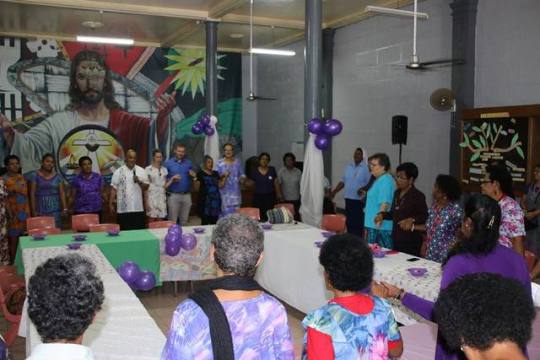

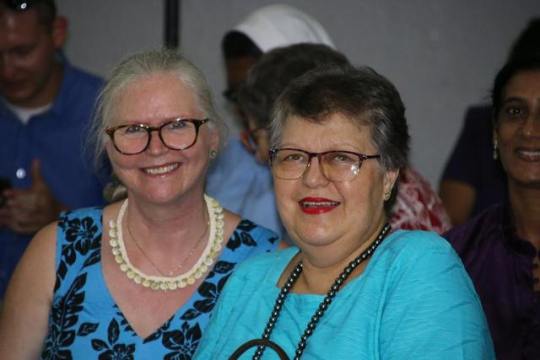
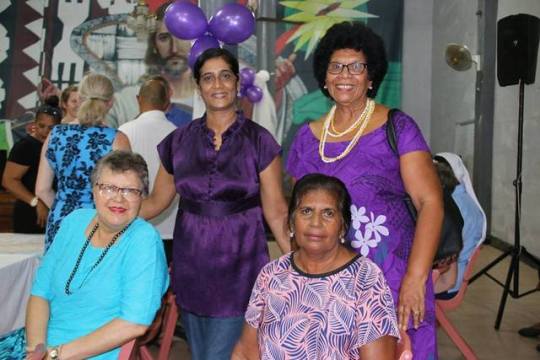
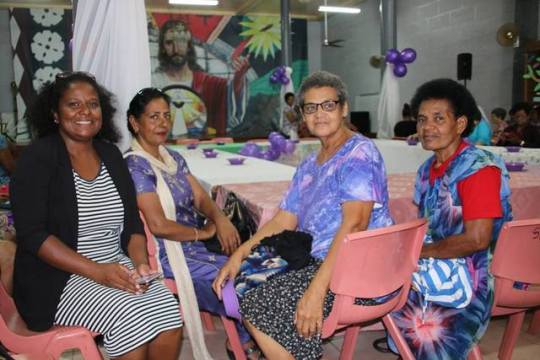
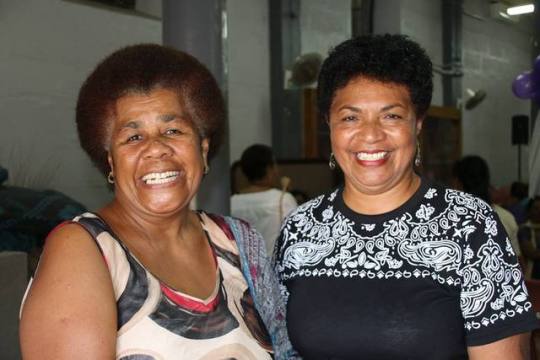
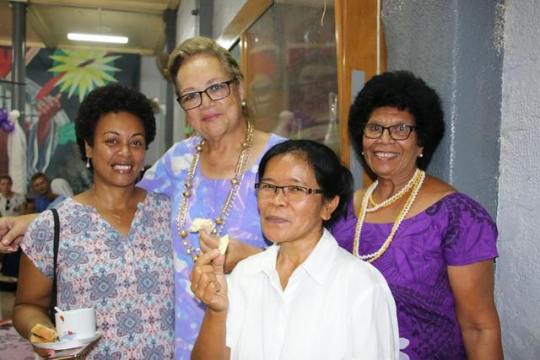
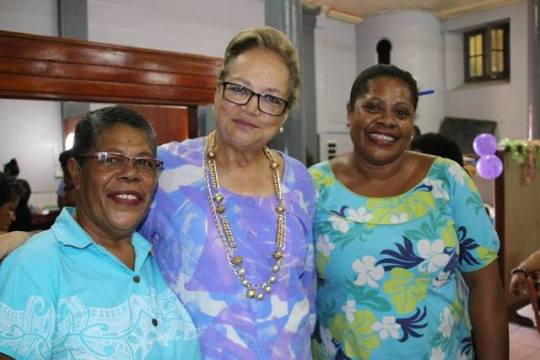
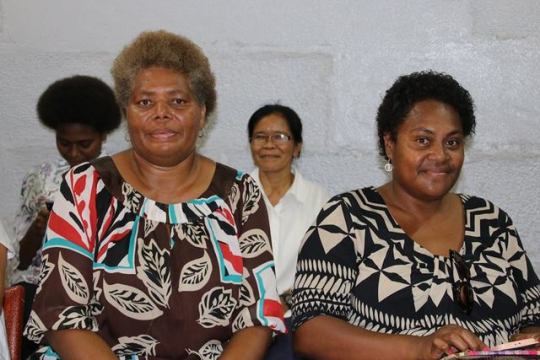
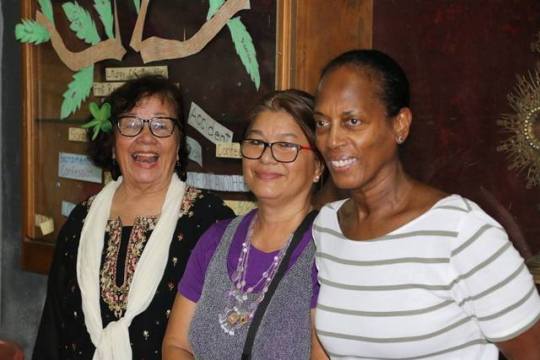
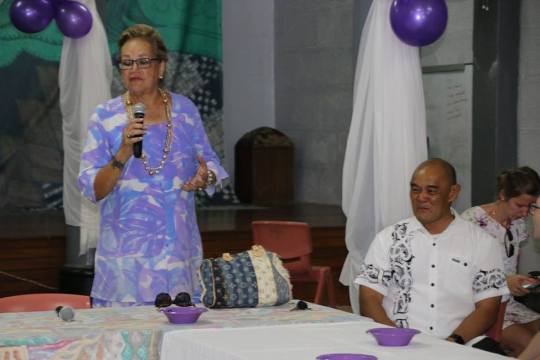
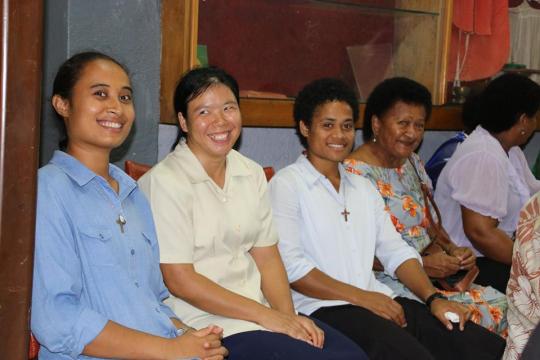
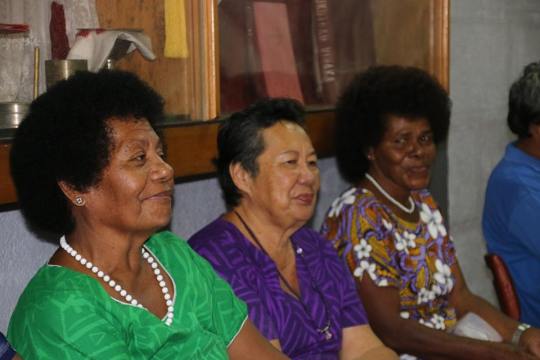
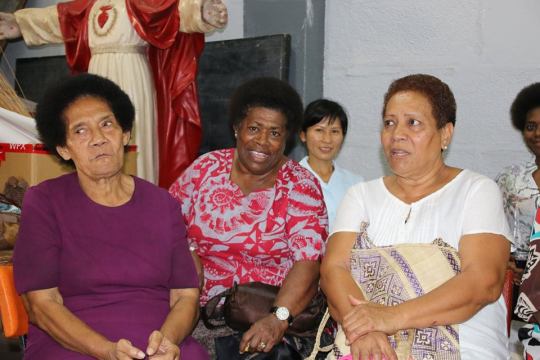
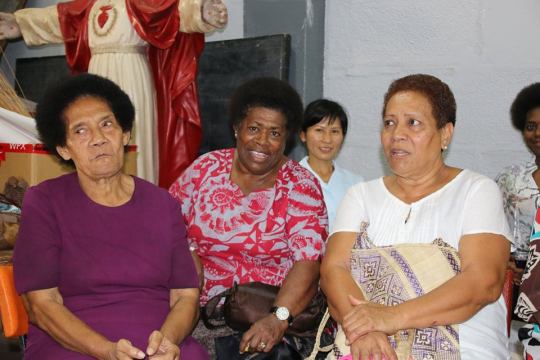
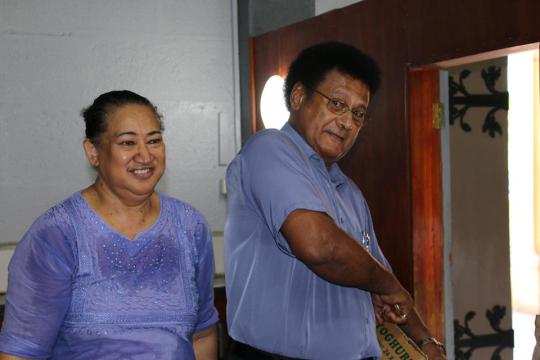
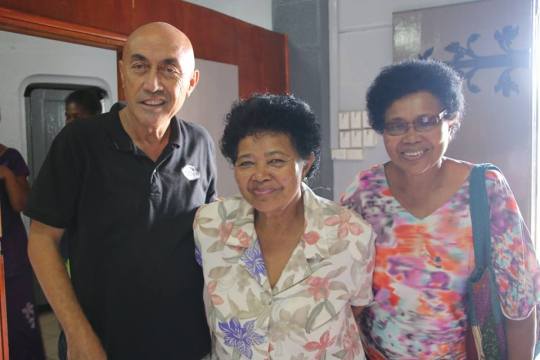
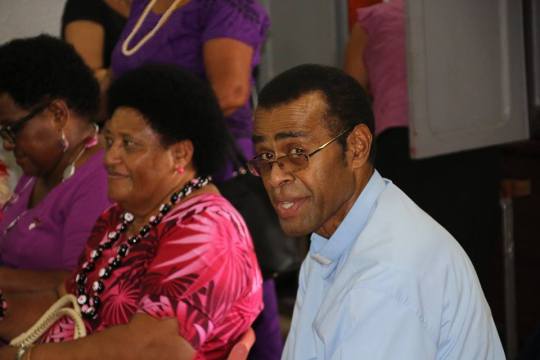
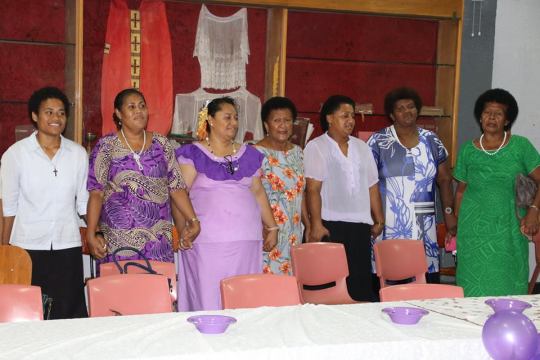

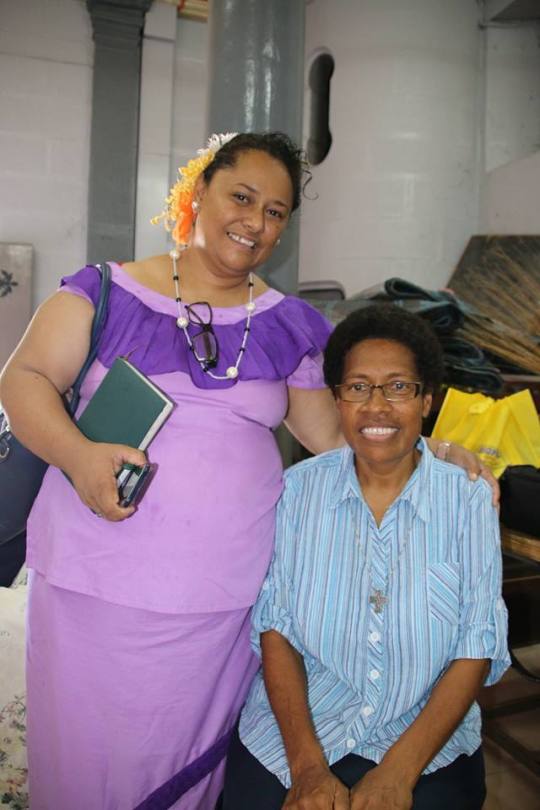
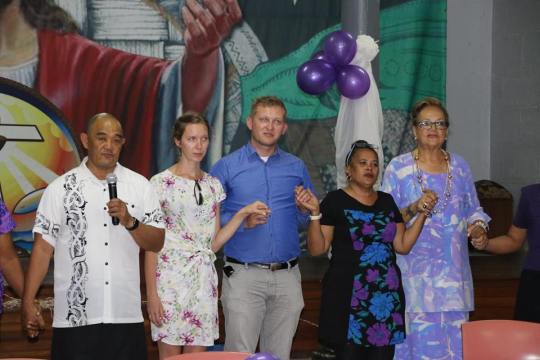
CELEBRATING INTERNATIONAL WOMEN'S DAY
‘BALANCE FOR BETTER’ MERE FONG Your Grace, my brothers and sisters in Christ. My name is Mere Fong of the Immaculate Conception Parish, Lami. Last night I was pulling out of my garage on my way to choir practice at our small church in Delainavesi when my phone rang. It was about a quarter to 7 and it was the Archbishop: ‘Mere, I have one big kerekere. I know this is last minute but can you speak at Mass tomorrow?’
As you can imagine, I went weak in the legs and I could feel the colour drain from my face. The choir members, who were waiting patiently, later understood why I looked shell-shocked when I arrived.
Under the circumstances, and perhaps in my previous life, I would have desperately looked for an excuse to chicken out. Oh no, no, no Your Grace, you must be joking….la’o sara! Qori ga na vunau…..sa rauti kemuni ga na turaga bete!
In fact I even tried the excuse that Dami had asked me to conduct the Curia choir today….but it was like His Grace wasn’t even listening, he kept talking! It reminded me a little bit of his story at the launching of the Synod Mass….the one about the lighthouse and the ship which was headed on a collision course with it – His Grace was not budging! So here I am today…
Having said that, I have always been inspired by the courage of another woman, spouse, daughter, and mother….the greatest woman ever to have walked this earth, and who to my mind, remains the most powerful of all intercessors.
So on this special day for women, I attribute the courage I have garnered to speak today, to Mary’s YES. Each time she was called by God….she pondered deeply in awe and wonder and allowed God to carry out His will.
I believe it is God’s purpose also that I appear humbly before you in this most revered capacity today, to share my reflection on the theme for this year’s celebration of IWD.
Last night when His Grace asked me if I knew the theme, I sheepishly said….no! So I looked it up when I got home – and it is this: Balance for Better.
As soon as I saw the word BALANCE, it struck a chord with me….the word BALANCE reverberated deep within me….and believe it or not… it had nothing to do at all with women or international women’s day for that matter!
For me it had EVERYTHING to do with CREATION - that there is BALANCE, order, harmony in everything God created. I was reminded of a presentation by our Lami parishioner and Ecologist Nunia Moko, at our parish Seminar on Church, which was held at the end of last year. She enlightened many of us on the actual mechanics of this interdependence and balance in all of God’s creation. She referred specifically to the local rainforests, rain clouds, and the many living organisms that have a distinct role to play, and work in sync with one another to ensure the flow of the water cycle, amongst other life sustaining purposes.
God designed our earth, so that everything works together very well, in perfect BALANCE. Nunia’s presentation mesmerized me and heightened my awareness of the inter-connectedness of all of God’s creation.
The IWD theme, BALANCE FOR BETTER is clearly aligned with God’s plan. God also intended that there is BALANCE between man and woman, the last and most superior of all of His creation.
Whilst He created us equal in dignity and status, he made us distinct from each other and made us male and female. God ordered that just as all of his other creation are dependent on each other, man and woman too are dependent on each other for the achievement of His purpose. We need each other, we are made for each other.
The American author Sheri Dew said that God “made us enough alike to love each other, but enough different that we would need to unite our strengths and stewardships to create a whole.” This complementary relationship between man and woman is intended by God to sustain life so that we can live our humanity to the fullest, and in co-existence with all of creation.
My much loved teacher, mentor and confidant, the late Sr. Genevieve Loo (Rest in Peace) used to remind us young ladies of Waimanu Road, that God made us boisterous young girls to be graceful young women and not climb the trees at the far end of the school grounds. She said that if he had wanted us to climb trees he would have made us strong and powerful, and he would have created us as young men instead…so we were always reminded to be ladylike. I had no idea what she was talking about at the time!
A basic example of complementarity can be witnessed in the family. I am sure you will agree, that whilst no family is perfect, a well ordered and loving family, is ultimately the manifestation of the harmonious and life-giving relationship between husband and wife.
My brothers and sisters in Christ, we are called to respect and embrace God’s divine plan for us, as man and woman…because he has a purpose for us, just as he has a purpose for all of his other creation.
Needless to say, It is when we deviate from His divine plan that we suffer the many consequences which we are now facing in the world today, and which we are called to address today with love and mercy.
I leave us with an excerpt from a simplified version of the Catechism of the Catholic Church (293 – 294)
Manifesting and Communicating the Glory The world was made for the glory of God, "not to increase it but to show it forth and communicate it" (St. Bonaventure). Love is the only reason God created. "God created to manifest his goodness" (First Vatican Council).
God's glory is the communicating of his goodness to us. "The glory of God is man fully alive" and man's life is the "vision of God" (St. Irenaeus). Creation exists "so God can bring about his own glory and our happiness."
We pray today that the witness of our lives will always GIVE GREATER GLORY TO GOD!
0 notes
Text
Reaction and Revolutionaries
Spec: Opposition: ideas and ideologies; individuals; liberals and radical groups and the Tsarist reaction.
Alexander II had an unusual upbringing: autocratic, but revolutionary, educated in being a tsar, spending time in government committees (including the peasant reform), but also languages, sciences, history, and was much more sensitive. He even went on a successful tour of Russia, visiting people and even prisoners, to build a tsar-people bond. He later went on a european tour, where he got himself Western ideas and a German wife. Though conservative, his liberal family guided a reformation (brother Grand Duke Constantine, for example). The first thing he did as tsar was sign the Paris agreement to stop the Crimean war. He then introduced multiple reforms through his rule.
By 1866 revolutionaries were increasing in number. Former student Karakazof blamed the Tsar for the suffering of Russian people, and narrowly missed killing the Tsar, who was honestly so tired of all the criticism, backfiring reforms and death attempts that he tried to reverse what he had done. His family life was in chaos, with sons dying, an openly acknowledged mistress and issues on succession, along with the liberal members of his family being pushed away from the Government.
They were replaced with conservative members, such as Count Peter Shuvalov, who made sure conservatives gained good posts, tightened censorship, placed more control over education, made military courts more used in important cases, increased rule by decree and was generally terrifying. His mate, Count Tolstoy, was Minister for Education, and believing it was the sciences causing revolutionary thought, he re-reformed the system. There was greater control of primary schools, with inspections to check the moral values enforced, classic subjects were put in more importance, science was banned in some places, universities were restricted to classics, and immediate expulsion was the sanction for those associated with revolutionary activities.
It appears Alexander’s rule at this time was confused and disorganised- for this didn’t occur after the reforms, but during them- local government reforms and military reforms continued on, and in 1872 the first women were allowed in universities. Women in Russia were some of the most active people in the discussion of social and political issues of the time. Many professionals believed educating women were good, so secondary school started accepting girls, and women even monopolised universities to get the courses they wanted. Some women even went to foreign universities. Many rejected the customary roles of women; women wanted to study and be independent. They thus felt compelled to join revolutionised groups to ensure a self-emancipation, for example the 1960s women circle (discussing sexual equality, education and radicalisation) and the 1870s ‘going to the people’ movement.
The emancipation is ironically considered the trigger to revolution- for it was seen as a massive trick of the peasants- Ogarev says “the old serfdom has been replaced by a new. In general, serfdom has not been abolished. The people have been deceived by the tsar!” Students, nihilists (people who rejected the norms of society), the poor and women all grouped together, fed by flows of books, in to mutual aid groups which also discussed revolutionary ideas- one example being Land and Liberty.
One student commented on how society was split in two- the oppressed, and oppressors, and those oppressors “cannot exist without him”- so “there is only way out of this terrible situation which is destroying contemporary men”, or destroying the tsar through “bloody and merciless revolution”. These people formed an intelligentsia. But with each restriction of education and censorship came more resentment and revolutionaries.
Russian intelligentsia were attracted to the science-based socialism and egalitarianism, after seeing how peasants lived. Herzen believed following a peasant commune would be a stable base for socialism, and after seeing this not happen after emancipation, he expressed his radical views in the newspaper The Bell. Chernyshevsky published ‘What is to be Done?’ in 62, based around the inspiring stories of those preparing for revolution (no sex, little food, constant bodybuilding) inspiring others in to the same life, including Lenin.
Nechaev published ‘Catechism of the Revolutionary’, which stated that revolution should be dedicated and ruthless, and his groups should split in to small, detached groups, highly disciplined. This likely inspired Lenin’s organisation of a revolutionary party. Lavrov wrote ‘Historical Letters’ which said that the educated were only so from the work of masses, who should be repaid by having their education put back to them in raising their social awareness of their own oppression.
The Populists or narodniks was a group of revolutionaries in the 1870s, inspired by Peter Lavrov, focused around socialism based around peasant communes. This way would avoid the evils of capitalisation and industrialisation (bad factory conditions). They gave up their current lives- often intellectual persons, or people with family- to ‘go to the people’ to spread their message to people who looked at the world differently at a fundamental level. Thousands were involved, presenting themselves as peasants, went and did such, some even learning skills like medical treatment, for this.
Some were rejected by suspicious peasants, but Hosking believes there is some evidence that some peasants shared their views of egalitarianism, or enjoyed help from people like Vera Figner, who worked in a zemstvo hospital and even set up a school for kids and adults. On the other hand, several were arrested and two massive trials were held (most got let off lightly, but some faced long sentences). The Court sympathised with the passionate individuals, but the Government was intent on giving them the Siberia treatment.
So it looked like peace was not the route for the overly conservative peasants- so a different route should be followed clearly. Plekhanov suggested a different kind of reform: reform clearly didn’t lie with the peasants. Capitalism was not an utter failure- it was going through a stage of investment, with better railways and factories, a stage that should not be stopped. So, it’s the working last who lead this stage that should also lead the revolution, in to Marxism rather than capitalism.
Others believed violent revolution was the answer to the peaceful failure. Thus Land and Liberty came to life- secret, disciplined and committed, they formed small groups in towns to support anti-autocracy action, from violent killings to helping escaped prisoners, that caused a huge response from the government, who moved trials to military courts to ensure their aim of destruction of such groups were fulfilled.
The movement split between the Black Partition, led by Plekhanov to promote peaceful revolution, and The People’s Will...who employed violence. Set on destruction of the state, land redistribution and the assassination of the Tsar. Two years later, in March 1881, they finally succeeded with two bombs. Five members of the organise paid for this with a public execution wearing placards saying ‘TSARICIDE’.
The time before his death was not very stable- officials killed, attempts to blow up royal palaces, 31,000 people put under Government surveillance in 1880 alone, as Alexander III said, ‘most terrible and abominable years Russia has ever experienced.’, the thousands turning out to celebrate the 25th anniversary of Alexander’s succession seeming meaningless. Too late, Minister of the Interior Loris-Melikov suggested abolishing the ‘third section’, only focusing on actual dangerous people, more peasant civil rights, and the zemstva forming a consulting body. Approved, but Alexander was assassinated before it could be implemented.
0 notes
Text
Dear Lutheranism
Dear Lutheranism,
I am a member of an LCMS congregation. But I addressed this letter to our brothers and sisters as a whole. We are all united by the Augsburg Confession, Small and Large Catechisms, and (for the majority of us) the complete Book of Concord. With this shared doctrinal background, I feel my concerns can and should be directed to all.
For various reason we Lutherans do not engage or associate much with other Christian denominations. I am not here to judge if any or all of the reasons are justified, but more so to air a concern that I have when we detach ourselves from the larger church. We all agree that our view of the Gospel—as explained in our confession—is the most accurate of the denominations and various groups of Christendom. No matter our feelings about our self-imposed isolation from many post reformation groups, there is a time where we must engage these groups. We must engage to show our historical approach of law and gospel accurately and have it be heard by Christendom as a whole. Keeping our accurate profession a secret, does no good for anyone involved or the universal church. I’d make a case that it is a part of our vocation to share God’s truth when miscellaneous events happen in the universal church. I say all of this to petition that we not remain quiet regarding the ‘Social Justice’ conversation that is currently taking place in the broader Christian community.
The majority of evangelical Protestants do not work with a correct framework including Law/Gospel distinction, Horizontal vs Vertical righteousness, or 3rd use of the Law. The conversation taking place about social justice would be a great opportunity to share our biblical approach to the masses and demonstrate the validity of our doctrine. One popular evangelical theologian has recently stated that “this recent (and surprisingly sudden) detour in quest of ‘social justice’ is, I believe, the most subtle and dangerous threat so far.” Instead of this position, Lutheranism offers the distinction between vertical righteousness (God to person due to being found in Christ) and horizontal righteousness (Person to person righteousness founded in our ability to love neighbor freely without concluding it is impacting justification). We can help demonstrate that it is possible to engage culture to attempt to end a form of oppression or hardship of neighbor and not falsely conclude that our relation to God is impacted by these acts of good works.
We believe, teach, and confess also that all men, but those especially who are born again and renewed by the Holy Ghost, are bound to do good works. - Epitome of Concord IV
And first, as regards the necessity or voluntariness of good works, it is manifest that in the Augsburg Confession and its Apology these expressions are often used and repeated that good works are necessary. Likewise, that it is necessary to do good works, which also are necessarily to follow faith and reconciliation. - The Solid Declaration of the Formula of Concord IV
As confessional Lutherans, we can show a correct dynamic between faith and works. We can demonstrate how the 3rd use of the law is applicable as God intends for use to live holy lives in the world. Even though we fail, are aim as the new washed and regenerate man is to drown the old Adam daily and strive to live per Gods commands.
Jesus stated that He did not come to abolish the Law but to fulfill the Law, and the law to love our neighbor is as real and applicable as ever. To conclude as the celebrity pastor John MacArthur has, that social justice is not the concern of the church is effectively a form of Gnosticism and denial of the command to love neighbor.
“But social justice means social equality, making sure everybody gets the social equality. That’s never going to happen in a fallen world, in the best of circumstances. But that is not the church’s concern.”- John MacArthur
It is true that there will always be the poor amongst us, but we are not called in holy writ to accept a problem because it will always remain until our Lord returns. To ignore the “fallen world” because it is inherently evil and only focus on the spiritual side of a person’s needs is a form of Gnosticism. This dynamic leads us to show preference, remove real empathy, and starts towards antinomianism. “Who cares that a lady was raped and murdered? We should not engage culture to state that women are made in the image of God and worthy of respect and dignity.” This could be a logical conclusion to women rights issue if this stance of evangelicalism is followed consistently. The world will never be perfect until Christ returns, but for us to be salt and light is a command of our Lord to us. Professor Joel Biermann has made an interesting statement on this:
“… to fulfill the 1st great commission, of being fruitful and multiple and have dominion over creation, means that culture building is good. So when we are working on culture building, what I mean by that would be life in the modern world … a way of honoring God and serving each other. This is God pleasing; it’s not a negative thing. And the implication of this is the material world is not evil. This idea just continues to hound us in the church and this idea is Gnosticism … Sin has messed everything up, but it’s still God’s good creation.” (Humanity in Creation by Joel Biermann, around 58min mark)
There is a striking difference between Professor Biermann’s focus on God’s command to nurture and shepherd creation (1st great commission) and John MacArthur’s argument that social equality will never happen in this fallen world and concluding it is not the church’s concern. To ignore the hardship and plight in the world because the world is fallen is not a biblical concept. We are actually commanded to the exact opposite. Refusal to love neighbor in our daily vocation is Gospel reductionism and against our creation mandate. I truly feel the world would benefit by Lutherans getting involved and sharing our doctrinal truths with Christendom.
Further, the majority of Protestantism has corrupted the understanding of the sacrament of Baptism. Thanks be to God that the sacrament is valid based His Word and Promises—not the understanding of man—but many Protestant have tried their hardest to remove God from the equation. To be able to speak to the objective truth in the waters of Baptism, God Himself unites us with Him making us brothers and sisters in Christ. Not hypothetical. Not kinda sorta. He truly washes us and applies Christ’s finished work to us and unites us.
For just as the body is one and has many members, and all the members of the body, though many, are one body, so it is with Christ. For in one Spirit we were all baptized into one body—Jews or Greeks, slaves or free—and all were made to drink of one Spirit. For the body does not consist of one member but of many. If the foot should say, “Because I am not a hand, I do not belong to the body,” that would not make it any less a part of the body. And if the ear should say, “Because I am not an eye, I do not belong to the body,” that would not make it any less a part of the body” – 1 Corinthians 12:12-16
A major theme found throughout the 1 Corinthians book is unity and not showing partiality. We truly are united to Christ in baptism and have become a part of the body of Christ. How can one part of the body ignore the suffering and plight of another part of the body. Or to be more accurate, how one member of the body of Christ declare that the concerns of another member in the body is not the concern of the church.
That there may be no division in the body, but that the members may have the same care for one another. If one member suffers, all suffer together; if one member is honored, all rejoice together – 1 Corinthians 12:25-26
This unity found and accomplished in baptism should draw us together to love and care about the trials and hardships that our brothers/sisters experience and face. This is a beautiful gospel truth. Is this not a perspective that can be added to the racial reconciliation conversation that is greatly over looked? Protestants talk about baptism but since God’s activity is removed, it is hard to articulate the reality of what took place by them.
The influence of the anti-social justice people goes far beyond just evangelical Protestant circles. Even in our Lutheran bible studies, I do not think it is rare to find people with a John MacArthur study bible being used. I would go as far as to bet that many in our pews can recognize and are more influenced first or second hand by John MacArthur than Greg Seltz. Many will hear the name Greg Seltzs and ask “Who?” That is exactly my point. Greg Seltz was a prominent speaker on the Lutheran Hour (Lutheran flagship radio ministry with estimated over a million listeners) from 2011 to 2017. One of our biggest celebrities in our tradition is less known/impactful than MacArthur and other prominent anti-social justice supporters. John MacArthur’s reach and influence is truly massive. I as a black man cannot avoid or ignore a movement in broad Christendom driven by MacArthur that declares that Social Justice is against the Gospel. A pastor named Josh Buice was involved in the creation of the, “Social Justice and the Gospel” statement went as far to state one reason they created the statement was “That civil rights movements end was that there is no end game.” He followed this by saying the people in the 1950s and 1960s—like the faithful Lutheran Reverend Bob Greatz and other stand up men—that risked it all did it for fame and because racial division was big business. I have three baptized saints that God has placed in my care who will live in this world when I am gone, ignoring this is not a reality for me.
Without social justice efforts Jim Crow may have never ended. Without social justice from a few faithful pastors, the truth that Africans in slavery were made in God’s image deserving dignity would not have been proclaimed. Without Social Justice efforts that amazing testimony and precedent set by the first Rosa would never have happened in Alabama. I know there have been Lutheran statements composed for Lutherans by Lutherans on the subject of racism and racial relations, but broader Christendom is releasing public statement. In contrast, our statements seem like backroom conversations not written for the world. This is not satisfactory. I know within our doors we can point to these documents, but I live in a world where most have no idea about anything Lutheran. We have removed ourselves from the dialogue between Christians on major issues that impact and influence God’s creation.
I know none of the theology I mention in this letter is new. But I needed to lay out my thoughts. I also know I could be barking up the wrong tree in writing this. The outreach of MacArthur and his friends are far reaching. In our small sector it is easy to just ignore him. But in the broader American church, his voice has impact. There is a chance you agree with John MacArthur and the anti-social justice crowd, but I am willing to take this chance. There is more good to be accomplished than negative from my point of view. I have seen some Lutheran blogs leaning in agreement with MacArthur’s and the published statement. Alt-right influence is increasing on various Lutheran platforms. We even have Lutheran discernment ministries quoting individuals who says “Thank God and white people for slavery” while dismissing social justice and racial reform. They do this attempting to join forces with the MacArthur brigade. These are not the Lutheran interactions we want to be known for. In general, the confessional Lutheran doctrines—of which we should be proud—are missing from dialogue.
I have been placed in this situation with nothing to lose. Denying the outworking of the gospel shown by actually loving and caring for your neighbor is a gnostic notion. I cannot be convinced otherwise. And it is an actual position being solidified in opposition to Social Justice. I pray that this is received with an open heart and that the benefits of actually stepping in the fray to respond to John MacArthur and this public statement will be considered. The opportunity to share our sound confessional principles with the American church, comfort those in our pews, and reject unbiblical notions which directly support social oppression cannot go unanswered. I pray that once again Lutherans will be willing to stand up for the Biblical principles they confess.
Love, Grace, and Peace,
Ty aka @Lex_Lutheran
0 notes